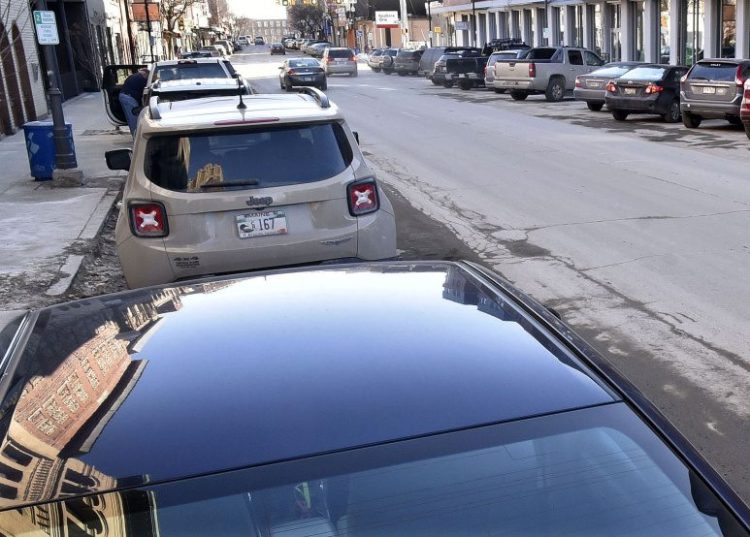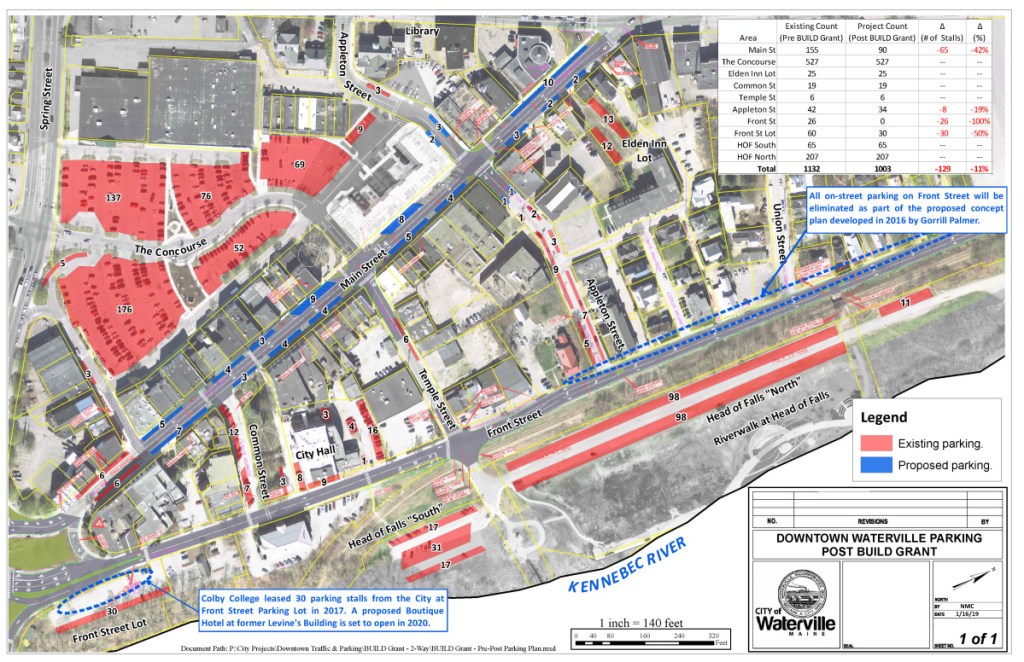WATERVILLE — The city’s Parking Study Committee on Thursday voted to recommend to the City Council that it increase parking fine amounts, with police Chief Joseph Massey saying the city’s fines are much lower than those of other municipalities he surveyed.
The city has multiple categories of fines, but Massey looked at four specific categories of parking violations — overtime, winter, handicapped and intersection parking, and found that Waterville’s $10 overtime parking fine is less than Bath’s $45, Lewiston’s $18 and Bangor’s $15, among other fines.
Waterville’s winter parking fine is $10, whereas Bath’s is $30; Augusta, $25; Lewiston, $26; and Bangor, $20. A fine for parking illegally in a space designated for the handicapped in Waterville is $50, whereas Bath, Bangor and Lewiston charge $200 and Augusta charges $50, and so on. Massey said some municipalities’ fines double after 30 days of nonpayment.
The committee voted Thursday to recommend the council increase overtime, winter and parking in intersection fines to $25, handicapped-space parking to $200 and stipulate that fines in other categories be increased to a minimum of $25. The city’s ordinance allows the city to double fines after 14 days of not being paid.
Parking issues are being discussed frequently as downtown revitalization continues. Massey reported that out of seven municipalities he contacted, six hire nonpolice workers to ticket vehicles, as that activity is not an efficient use of Police Department resources.
Last year, Waterville collected $6,100 in parking fines; and the year before, $7,200, according to Massey. He said Biddeford is doing a complete overhaul of its parking management plan.
“Each community with a condensed downtown is having parking issues,” he said.
The committee discussed how best to do parking enforcement and how to do it in a way that the city does not lose money yet prompts people to park legally.
City Councilor Jay Coelho, D-Ward 5, said if drivers are fined $25, they will move their vehicles, and enforcement is key. He said that with increased fines and hiring someone to ticket vehicles, the revenue would pay for the position.
“One ticket every other hour is essentially going to pay whoever is walking around,” Coelho said.
The discussion turned Thursday to an issue business owners raised about some Colby College students who live downtown continuing to park in certain parts of The Concourse and using spots business patrons need.
Committee member Ken Vlodek, owner of Yardgoods Center near the Colby dormitory, said that before the dormitory was built, Colby officials promised students would not park there, but they continue to do so.
“Something needs to be done,” he said.
Mayor Nick Isgro said he does not think there is a parking problem downtown — that only once did he have trouble finding a parking space downtown and that was when a popular event was at the Opera House. But he said Vlodek was not wrong about the promise Colby students would not park in front of businesses.
“Collectively, we need to figure out a way to get it through that ‘you need to park somewhere else,'” Isgro said.
Committee Chairman John Fortier asked why students do not understand the problem.
Brian Clark, vice president of planning for Colby, said students are informed about the parking matter on a weekly basis.
“We try to get this message to them as much as we can,” Clark said.
Cindy Jacobs, president of the Waterville Public Library board of trustees, said some patrons who have used the library 30 years have said they purchased nonresident cards from other libraries because they can not find parking close to the library now. But Jacobs emphasized the library wants and likes having the Colby students downtown and it is important to have them in the community. Having them here will help make the downtown successful, she said.
Fortier said the issue poses a problem for business owners.
“It’s not fair,” he said.
Massey counted parking spaces in that area of The Concourse over a period of 20 days, and there were never fewer than 20 open spots, he said. Isgro recommended enforcing parking rules there.
Meanwhile, the committee, which met on the second floor of 173 Main St. downtown, got a first look at parking changes that would result as a $7.37 million federal grant for downtown Waterville is put into action.
Waterville learned last month it would receive a $7.37 million federal Better Utilizing Investments to Leverage Development, or BUILD, grant to change the traffic patterns downtown from one-way to two-way and improve roadways, intersections, sidewalks, and public green spaces. Waterville is the first municipality in Maine to receive a BUILD grant.
The City Council on Tuesday took the first of two votes needed to accept the grant, which would be used as part of Waterville’s downtown revitalization effort and is part of $26.6 million awarded to Maine projects through the BUILD program.
Waterville applied for the grant after Colby College, the city, businesses and community groups met over six months in 2015 to identify short- and long-term investments that would help improve the downtown and create a vibrant, thriving commercial and cultural destination.
In 2016, the city adopted a downtown revitalization strategy that spurred Colby to buy and renovate historic properties, build a mixed-use residential complex and make plans to build a hotel. New shops and restaurants opened downtown, and a RiverWalk was built at Head of Falls.
The City Council in 2017 voted to pursue outside funding for downtown improvements and applied for the BUILD grant, with cooperation from Colby and the state Department of Transportation.
The $7.37 million grant is to be used toward a $9.2 million project consisting of infrastructure improvements in downtown Waterville. Main and Front streets would be converted to two-way traffic, which will direct drivers into downtown to help increase economic activity and property values and help improve traffic flow for commuting traffic.
City Manager Michael Roy presented renderings Thursday of the downtown, showing areas where parking would be lost with two-way traffic. Main Street, for instance would lose about 65 spots with the proposed changes; Front Street, about 26 and another 30 in the city parking lot on that street; and Appleton Street, eight spaces, for a total of 129.
Roy said a yearlong process of design and engineering this year will allow plenty of time for further debate on parking issues and “what gets eliminated and what stays.” All of 2019 will be devoted to refining the plan, which is displayed on the wall of City Hall for people to see, he said.
The grant also would be used to help improve safety downtown and make it more pedestrian-friendly. Intersections and gateways including the Spring Street intersection would be made safer, downtown sidewalks rebuilt, benches and plantings added downtown and Castonguay Square redesigned.
Public input into the project will start this spring to help design new downtown streetscape amenities including sidewalks, street furniture, trees and plantings.
Amy Calder — 861-9247
Twitter: @AmyCalder17
Send questions/comments to the editors.




